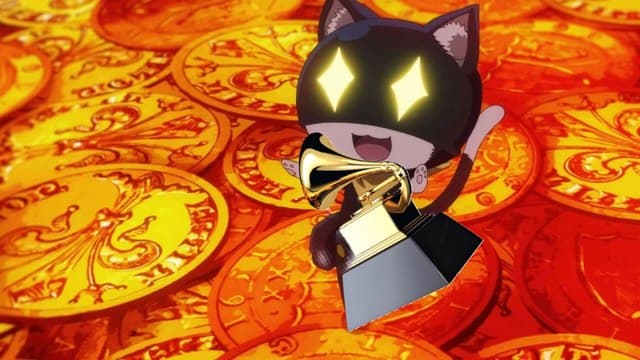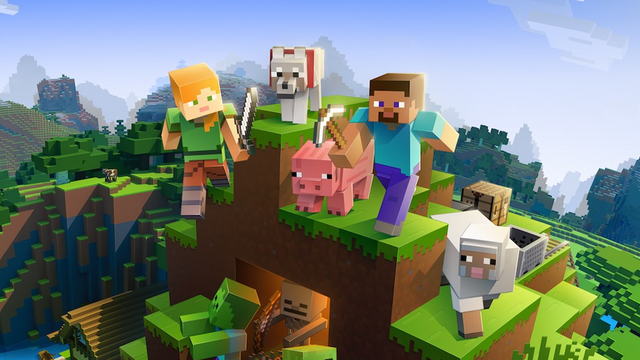When Charlie Rosen, the band leader and arranger of 8-Bit Big Band, submitted the group’s cover of Kirby Super Star’s “Meta Knight’s Revenge” as consideration for a Grammy, he didn’t expect anything to come of it. Little did he realize that just a few short months later, he and his collaborator Jake “Button Masher” Silverman would be on the stage in Las Vegas to accept the award.
Rosen is a member of the Recording Academy, which votes on the nominees that eventually make their way to the internationally broadcast Grammy award show. This role gave him an opportunity to self submit his work for consideration, but he readily admits it was on a whim. When “Meta Knight’s Revenge” landed on the final list of five nominations, it caught him by surprise.
“I sort of wrote it off. I kind of forgot about it,” Rosen tells Fanbyte. “I voted in the first round, and voted for myself obviously, and then I was in London working on a movie and I was at a board game cafe with a friend just playing some board games. It’s five hours different there, so it was like 9 or 10 p.m., [I was] having some beers, and playing whatever we’re playing, then suddenly I feel my phone vibrating like crazy. I was like, ‘no way. There’s no way,’ So I called Jake and I was like, ‘I can’t believe it.’”

The 8-Bit Big Band is a jazz orchestra ensemble that ranges from 30 to 65 members depending on the performance. Rosen’s goal with the group has been to reimagine video game music in new styles, especially retro ones where technology hadn’t caught up with some of the musical ideas composers had.
“Sometimes, I listen to an original piece of video game music from the soundtrack and I go, ‘okay, I hear what you’re going for. You didn’t have a lot to work with technologically in the ‘80s, ‘90s, early 2000s. It was all these MIDI instruments, computer or programming, and synths. But I hear the genre that you’re trying to go for, and I’m gonna take that genre and run with it as far as possible in the way the original composer intended it to be done.’”
But sometimes 8-Bit Big Band isn’t about bringing out what a composer envisioned, but instead finding new, off-the-wall ways to reimagine a song. One example being “Stay Alive” from Portal, which Rosen rearranged from a cheery-sounding acoustic song to a swinging rendition with vocalist Benny Benack III crooning the lyrics once sung by Ellen McLain as her villainous character GLaDOS.
“All my arrangements come dramaturgically from a seed of an idea that I have that’s influenced by something that I hear in the unrealized potential of the piece,” Rosen says. “In the case of Portal, the thesis of it is ‘What if Frank Sinatra had played Portal and wanted to sing the song? What would that sound like?’”
You may also like:
- Fuser Is a Rhythm Game for the Spotify Era
- I’m Still Crying About the Sonic Symphony Concert Days Later
- Post Malone’s Pokemon Concert Was a Great Music Video, Middling Live Show
The inspiration for Kirby Super Star’s “Meta Knight’s Revenge” came from both an admiration for original composer Jun Yishikawa’s work, which Rosen describes as “groundbreaking” for the Super Nintendo era, as well as a desire to collaborate with Silverman, whose work he discovered on Instagram.
“He does this amazing thing where he takes the [sound bites] from the games and he puts them on his MIDI keyboard and rearranges them in this contemporary jazz fusion style using the sounds from the game in a really incredible way. So when I heard that, I contacted him and thought ‘hey, he does a great “Meta Knight’s Revenge.” Can we work together on this? Can I expand it for the 8-Bit Big Band? Can I add some stuff?’”
For Rosen, collaborating with Silverman on “Meta Knight’s Revenge” is an anomaly in the 8-Bit Big Band’s catalog, as he hasn’t worked on compositions with other arrangers very often. However, he has felt more open to it as time has gone on.
“I am a career arranger, and that’s what I do, and this band is my voice as an arranger,” Rosen says. “And so I want to be involved heavily in all the arrangements, because that’s sort of the main event for me for this. But when I’m particularly inspired by a specific musician, who is also a great arranger, then I’m happy to collaborate.”
That feeling of ownership has seeped into Rosen’s feelings on making the 8-Bit Big Band’s arrangements publicly available for other ensembles. While the group’s website contains sheet music for two of its arrangements (“Aquatic Ambience” from Donkey Kong Country and “Bob-Omb Battlefield” from Super Mario 64), Rosen says both the legal gray areas of distributing arrangements and a desire to keep these reinterpretations underneath the 8-Bit Big Band’s name has made him hesitant to make sheet music a pillar of what the group offers.
“I generally don’t tend to distribute the arrangements because I feel like these arrangements are our product and our flagship product,” Rosen says. “And you know, I’d like to stay in control of where and when those arrangements are performed as much as I can. Obviously, people are going to transcribe them. And that’s, well, it is what it is. That’s fine. But you know, it’s sort of like we have the ‘true’ performance.”
But that willingness to collaborate helped the 8-Bit Big Band win the award for Best Arrangement, Instrumental or A Cappella at the Grammy’s 64th annual awards ceremony. Though, up until the point Kirby Super Star’s “Meta Knight’s Revenge” was named on the stage, Rosen still didn’t think it was possible they would win for a rearrangement of a video game song. Comparatively, other nominations included a rearrangement of film music like “For the Love of a Princess” from Braveheart, which Rosen says feels less niche to the people who vote for the Grammy’s each year.
“I was sort of like, ‘there’s five great arrangements and other Grammy winners and really great artists in this category. And this is, again, this is video game music.’ We’re sitting there and I remember turning to Jake being like, ‘hey man. It’s insane that we were nominated. That’s a huge win. So thank you.’”
View this post on Instagram
That resignation was quickly replaced by excitement, as Rosen and Silverman headed up on stage to accept the award. They thanked Nintendo and Jun Ishikawa for the original Kirby song, and for all the musicians that have contributed to 8-Bit Big Band. Oh, and Rosen also shouted out his parents, who were in the audience.
“It was all such a blur,” he says. “The shot of adrenaline comes so quick and we were just so stunned and we’re like ‘we have to go, we have to run up on stage. It really just happened so fast. It’s truly insane. There’s so many people there. It was sort of like being shot out of a cannon full of joy.”
Notably, as of this writing, Rosen still hasn’t received his gold-plated gramophone trophy. No, each of those you see at the award show is a stand-in for the winners. He was told he’d get it in around two months after the show, but still hadn’t heard anything by the time of our interview.
So, where does the 8-Bit Big Band go from here? Rosen says the plan is to keep doing what they’re doing, which includes working on a fourth album. The ensemble is booking performances in New York, Boston, Miami, and Los Angeles, and is bringing the award to negotiations.
“Having the Grammy is making it a lot easier for venues to be like, ‘oh, okay. Cool, we’ll give it a shot,’” Rosen says.
When I spoke to Rosen about his experience, I jokingly asked him how it felt to have more Grammys than pop artist Katy Perry, who has been nominated for Grammy awards multiple times throughout her career, but has never taken one home. His response echoed the sentiment he left on stage at the end of his acceptance speech: “long live video game music.”
“It’s apples and oranges, and her category obviously had way more entries,” he says. “So I’m just happy to win one for what is arguably an incredibly niche genre, but an incredibly passionate genre. It adds a huge amount of legitimacy to the fact that these video game music composers deserve recognition outside of the vehicle of the games they wrote the music for.”


